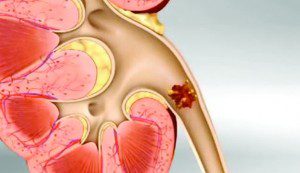Dr. Carl Klutke
 Kidney stones are one of the most common disorders of the urinary tract, accounting for more than 1 million visits to healthcare providers in the U.S. each year.
Kidney stones are one of the most common disorders of the urinary tract, accounting for more than 1 million visits to healthcare providers in the U.S. each year.
The reasons for stone formation can be complex but there are a few factors that indicate a higher risk for developing them:
• Family history
• Urinary tract infections
• Some metabolic disorders
• Use of certain medications such as diuretics and calcium-based antacids
• History of gastrointestinal surgery
• Chronic inflammation of the bowel
• Being overweight
Treating Kidney Stones
Depending on the stone, where it’s located and your overall condition, there are several ways to treat a kidney stone.
Allow the stone to pass on its own. Many kidney stones can be allowed to pass normally in the urine. This may be done with or without the aid of medication. The decision to allow the stone to pass naturally depends on its size, type, location, your overall health and pain level.
Remove or break up the stone. If the stone is large, won’t pass or is associated with an infection, it may be necessary to remove the stone. Options include:
• Shockwave lithotripsy. This is the most common procedure used to treat kidney stones. Shockwaves are directed at the stone from the outside to break it up into fragments that will pass naturally.
• Ureteroscopy. The doctor inserts small instruments through the urethra and bladder up to the ureter and uses a laser to break up the stone.
• Percutaneous stone removal. Used for larger stones, a small incision is made in the back and a tiny camera is inserted into the kidney. Lasers or other devices are used to break up the stone.
Avoiding Kidney Stones
You can reduce your risk of developing kidney stones by:
• Drinking plenty of fluids, especially water. This helps flush minerals out of your kidneys before they can build up and form stones. Eight 12-ounce glasses of water a day are recommended. Fluids high in citrate are best (lemonade, limeade…) as citrate is a natural inhibitor of stone formation.
• Following a healthy diet. If you’ve had a kidney stone, talk to your doctor about the type. This will help you avoid those foods that increase your risk. You may be told to:
– Limit your intake of sodium (salt) and animal proteins
– Avoid foods that are high in oxalates, such as chocolate, nuts, leafy green vegetables, black teas and colas
– Get the recommended daily allowance of calcium in your diet. Too much or too little calcium can contribute to kidney stones.
– Avoid excessive amounts of vitamin C
– Lose excess weight
Dr. Carl Klutke is a Board Certified Urologist who is Fellowship trained in Female Urology, Voiding Dysfunction and Urodynamics for males and females. RTR Urology is proud to add his decades of experience to their leading edge treatments with a caring touch.
RTR Urology
842 Sunset Lake Boulevard, Suite 403
Venice, FL 34292
941-485-3351
www.RTRurology.com









